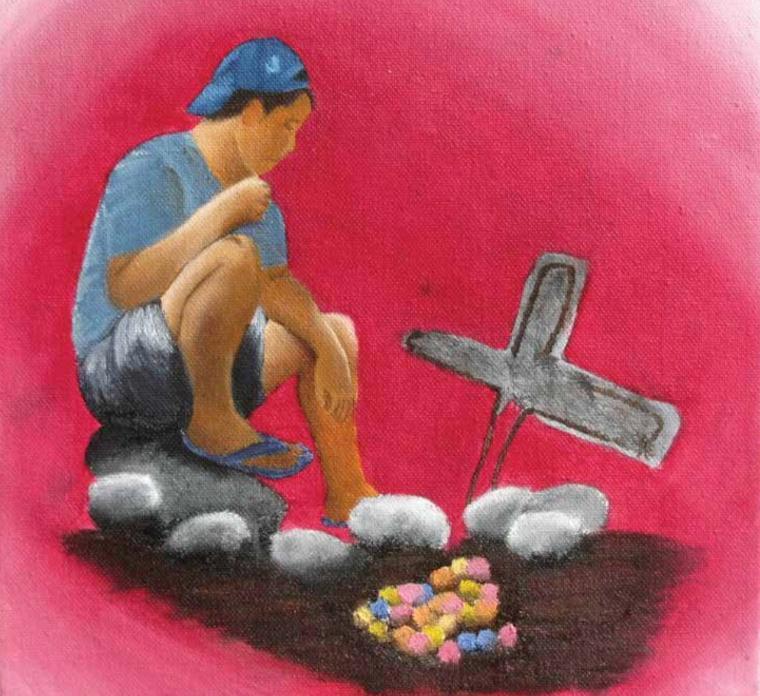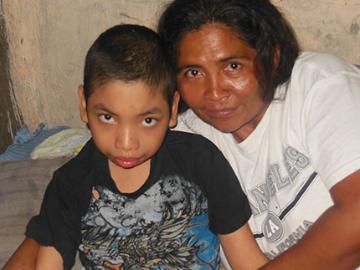
Witnessing to La Verdad: The Demands of a Jesuit Education
A Response to Lucía Cerna
“I felt sick. I almost felt like an animal just walking and walking… that image, what I had seen that night, just kept reverberating in my head and just nothing, nothing.” These are the words of Lucía Cerna, witness to the murder of six Jesuit priests, their housekeeper and her daughter in El Salvador. The Jesuits at the Universidad de Centroamericana (UCA) in El Salvador courageously sided with the poor and persecuted Salvadorans who dreamed of a better life, free from war and poverty. The Jesuits had been messengers of hope and advocates for justice. Their martyrdom at the hands of the Salvadoran military forces left a scar on the country and deeply impacted Lucía, who was the sole witness of the killings to come forward. In a way, the sorrow and grief that Lucía expressed reflects the greater struggle for liberation by marginalized Salvadorans, a struggle that continues today.
 One woman’s life story in particular brought me face-to-face with the daily suffering endured by the majority of Salvadorans. Her name is Blanca. She lives in a small home located in La Valencia about forty-five minutes from San Salvador—the center of national commerce and the capital of El Salvador. A few years ago her son, Albertito, was infected with meningitis and became paralyzed and ultimately, unable to speak or feed himself. Blanca is a very determined and intelligent woman and had been training to become a nurse. Her future employment prospects in health care would have offered her large family a more comfortable income than picking coffee and selling vegetables could provide. Unfortunately, Albertito’s condition left her with no choice but to abandon her opportunity in order to care for him full-time. Hiring someone, or trusting his care to a medical facility, was economically impossible.During the fall of 2013, I was a student in Santa Clara University’s Casa de la Solidaridad study abroad program in El Salvador. One aspect of the study abroad experience which impacted me profoundly was the community engagement component. Along with my “praxis” partner Emily, I spent two days a week accompanying members of the La Valencia community. La Valencia is located on the side of the San Salvador volcano and weaves in and out of the coffee farms that the residents work throughout the year. The members of the community are some of the most impoverished in the country, working long hours picking coffee beans in the sweltering heat for a meager five dollars a day.
One woman’s life story in particular brought me face-to-face with the daily suffering endured by the majority of Salvadorans. Her name is Blanca. She lives in a small home located in La Valencia about forty-five minutes from San Salvador—the center of national commerce and the capital of El Salvador. A few years ago her son, Albertito, was infected with meningitis and became paralyzed and ultimately, unable to speak or feed himself. Blanca is a very determined and intelligent woman and had been training to become a nurse. Her future employment prospects in health care would have offered her large family a more comfortable income than picking coffee and selling vegetables could provide. Unfortunately, Albertito’s condition left her with no choice but to abandon her opportunity in order to care for him full-time. Hiring someone, or trusting his care to a medical facility, was economically impossible.During the fall of 2013, I was a student in Santa Clara University’s Casa de la Solidaridad study abroad program in El Salvador. One aspect of the study abroad experience which impacted me profoundly was the community engagement component. Along with my “praxis” partner Emily, I spent two days a week accompanying members of the La Valencia community. La Valencia is located on the side of the San Salvador volcano and weaves in and out of the coffee farms that the residents work throughout the year. The members of the community are some of the most impoverished in the country, working long hours picking coffee beans in the sweltering heat for a meager five dollars a day.
Just as it was a responsibility for Lucía to expose the Salvadoran military for what it had done to her Jesuit friends, it has become my responsibility to share Blanca’s story.
I vividly remember the moment when the weight of her suffering fully penetrated my being. It was a moment that broke down the barriers that I had constructed around my heart. Emily and I were sitting between Blanca’s home and the shed where she cooks beans and tortillas. We were served a plate of rice our community coordinator, Maria Teresa, made for us and a few of Blanca’s young nieces and nephews that she cares for as well. Suddenly, Blanca wheeled Albertito out of the dark home and parked him across the table from us. She pulled up a chair next to him and began feeding him a mix of rice and beans. After pausing for a moment, she looked up at me and cracked a tender smile. My eyes welled up, not simply because I was sad for her situation, but because I was overwhelmed by an intense hope that had suddenly arisen in me. Never before had I witnessed such a profound moment of love shared between a mother and her son. Moments like these have remained present in my heart. What continues to surface daily in me, even today, is not only the reality of struggle and poverty that Blanca and her family face, but also the faith and courage they exude in their fight to support each other and seek out a more dignified reality.

Lucía’s courage has also inspired and challenged me. In recounting to the FBI the traumatic events of the martyrdoms that she had witnessed, she chose to tell la verdad. It was a truth that the governments of both El Salvador and the United States did not want to hear. At the time, the U.S. government was giving millions of dollars of aid to the Salvadoran military in the name of anti-communism. The FBI abused Lucía in an attempt to silence her, yet day after day she told the truth. She told the truth knowing that her truth would eventually be heard by the world. Lucía recalled the inspiration she drew from the Jesuits to be bold: “The priests have always taught me to have faith and to have confidence in what I believed, and that there was a responsibility in being able to believe and hold onto what I knew was right.”
Lucía speaks with such inspirational conviction and simplicity. Her witness stirs me to be a vocal witness of injustice. Just as it was a responsibility for Lucía to expose the Salvadoran military for what it had done to her Jesuit friends, it has become my responsibility to share Blanca’s story. There is no turning away from the encounters that I have been blessed to have. Being in the presence of Blanca and other companions in El Salvador has broken my heart but also charged me to work for justice. Blanca’s strength and faith have revealed to me the true potential that we, as humans, have to endure suffering and to love. Her reality makes visible unacceptable systems of oppression that exist in Salvadoran society, the United States, and beyond. These are systems that keep families in inescapable cycles of poverty and deny human beings their most fundamental right: the right to dignity.
As my time at Santa Clara University comes to a close, I ask myself and my peers: “How will we walk with the poor?” This is what a Jesuit education demands of me, of us. Today, I walk with undocumented immigrants of the United States locally through the Day Workers’ Center in Mountain View, California. Here on Saturday mornings, with a group of SCU students, I have sought to cultivate relationships with local day laborers—many of whom left their homes in Central America in the search of a more dignified life. Additionally, I have been inspired to join a young group of Latino students at Santa Clara University who have founded a student organization called “Creating Progress at Home,” dedicated to addressing the root causes of immigration in México. Blanca and Lucía continue to challenge me to respond to their lives, their witness, through the commitments of my own life. How will I walk with the poor? How will I advance the cause of justice and bear witness to our shared human dignity? This is what a Jesuit education demands of me, of us.
Ian Layton is a senior at Santa Clara University, double majoring in Political Science and Religious Studies. He is passionate about current issues in Latin America, as well as the history and diverse array of culture throughout the region. Upon graduation he plans to return to Central America to engage in service and accompaniment of a local community.
Endnotes
- Lucía Cerna and Mary Jo Ignoffo, “La Verdad: Witnessing Truth in the Service of Justice,” panel dialogue, 2014–2015 Bannan Institute: Ignatian Leadership series, November12, 2014, Santa Clara University. A video of the full lecture is available online at: scu.edu/ic/publications/videos.cfm
- For more information on Santa Clara University’s Casa de la Solidaridad program in El Salvador visit scu.edu/casa/
- Lucía Cerna and Mary Jo Ignoffo, “La Verdad: Witnessing Truth in the Service of Justice,” panel dialogue.

